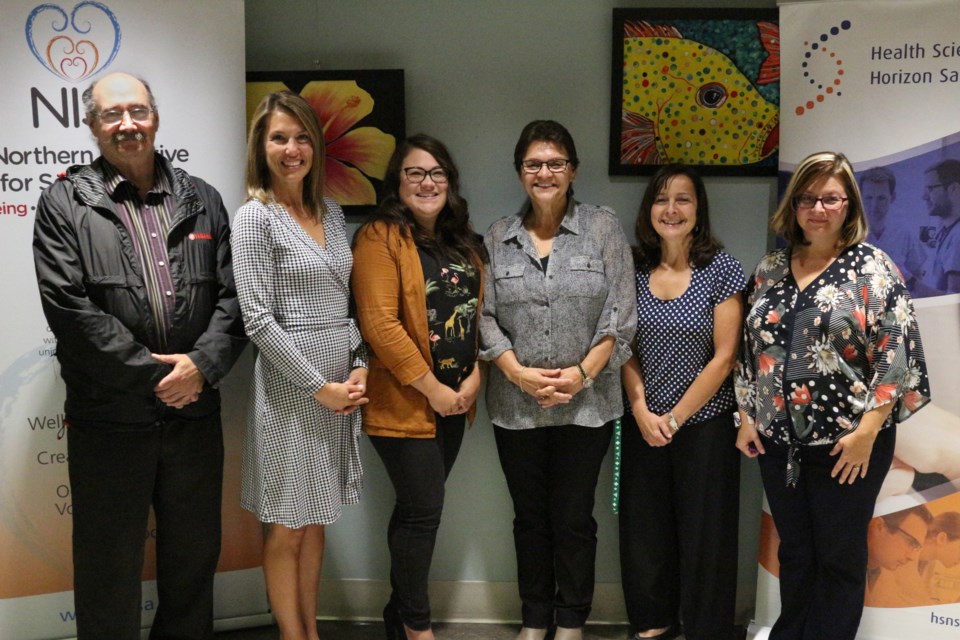Patients experiencing a mental health or addiction crisis can expect a new form of empathy-based support when visiting the Health Sciences North (HSN) emergency department, thanks to the centre's adoption of the Peer Navigator program through the Northern Initiative for Social Action (NISA).
The Peer Navigator program is a service through which individuals with lived experience relating to mental unwellness or addiction help patients understand the health care process, provide emotional support and offer guidance on the community resources available upon discharge.
This can include helping patients communicate their needs, to establish a comfortable and effective care plan for the benefit of both client and staff.
"(The) peer navigator looks at the patient as the person," said Dinah Laprairie, executive director of NISA. “They know that there are all kinds of factors that are bringing somebody to the point of crisis and they will help that person sort through what's going on so they can communicate with the doctors and nurses.
"When you're in crisis, it's also a really great opportunity to make a change in your life...it's a great time to discover new avenues to good health."
The free service will be available seven days a week from 2:30 to 10:30 p.m. upon request, or through referral by a member of the nursing staff.
Admitting one's self to the emergency department can be a stressful experience, said Crystal Pitfield, clinic manager of the Emergency Department at HSN, amplified if they are unfamiliar with the process of admittance or the care available at a health care facility.
"The peer navigator lightens that burden through their demonstration of kindness, active listening, empathy and respect," said Pitfield.
"Through the lens of shared experience, they provide an understanding and awareness of how to manage many of these uncertainties and compliment HSN's clinical team in providing high-quality, patient-centred care."
The Peer Navigator program was introduced in Northern Ontario in 2011 at the North Bay Regional Health Centre, through a partnership with a charitable community organization known as People for Equal Partnership in Mental Health Nipissing (PEP). It was introduced as part of the hospital's efforts to address various concerns, including wait times, by introducing alternative forms of care, said Joel Johnson, lead regional Peer Support Navigator in Emergency Departments with PEP.
The service was designed in collaboration with the Local Health Integration Network (LHIN) using emerging practices introduced in Southern Ontario, he said and adjusted over three years to suit the needs of their clientele.
Chelsea Gauthier found the program two years ago when researching ways to improve gaps in Sudbury's health care system, identified through her own lived experience.
In working with the North East LHIN and the Regional Mental Health and Addiction Advisory Council, Gauthier helped achieve funding from the Ministry of Health and Long Term Care to expand the program to Health Sciences North, Sault Area Hospital and the Timmins and District Hospital.
"Peer Support has been shown to increase hope, empowerment and feelings of being understood, particularly within the emergency setting and during times of crisis," said Gauthier.
"I truly believe this service will increase individuals' positive experiences in the emergency department, lead to better and more appropriate care, decrease time spent in the emergency department and allow individuals to feel a stronger sense of control, empowerment and dignity regarding the type of care they receive in the emergency setting."
NISA was able to hire two Peer Navigators to launch the program, one of which was part of North Bay's pilot program seven years ago.
Claudie Doiron, lead peer navigator, moved to Sudbury since that time, where she has worked as a peer worker at NISA for the past five years.
She credits the success of the program to the fact that those involved are peers, who are transparent about their own experience and can, therefore, establish a relationship based on mutual respect and understanding.
"We create a safe space and comfortable space that removes labels that exist in clinical settings," said Doiron. "We can validate people's journeys, because in some way we've walked down a similar path."
